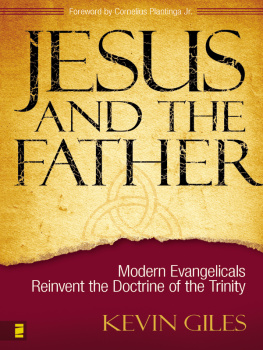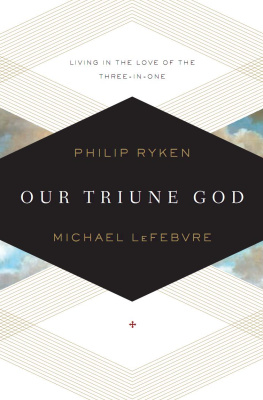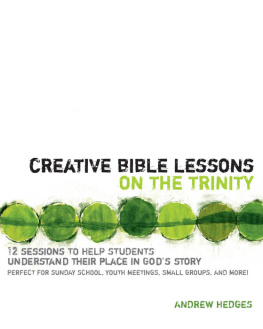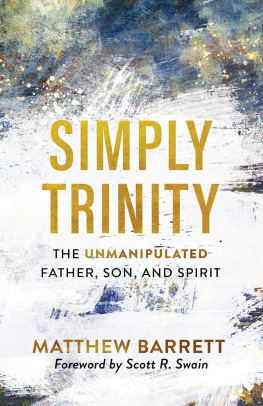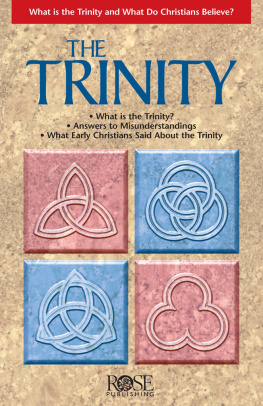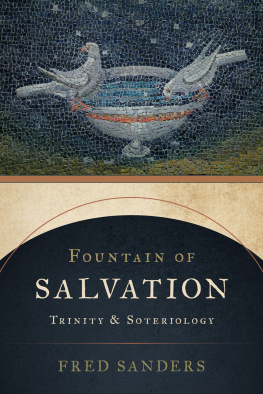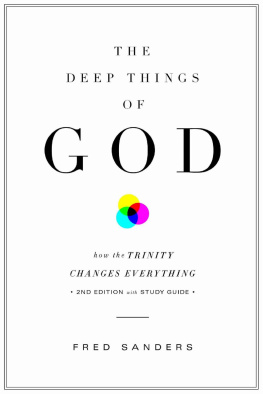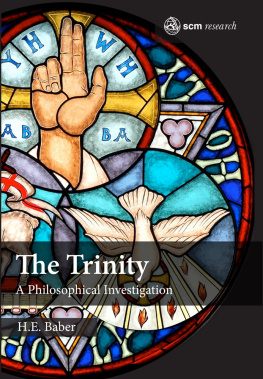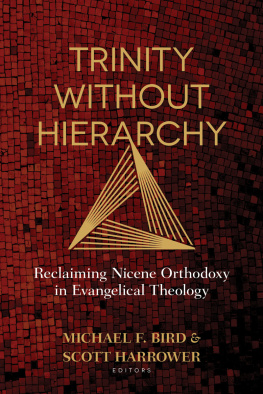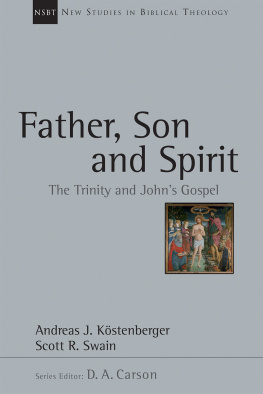One of the weirdest heresies that has been generated in the last century pertains to the postulation of a hierarchical order within the members of the Trinity as if there ever could exist a threat of discord or of misconduct that would require the exercise of authority within the oneness of the Godhead. This book not only exposes the agenda for the promotion of the subordinationist theory but also establishes its fallacy from both Scripture and from patristic history. By showing that subordinationism is a revival of a heresy that was systematically rejected by the non-Arian church, the author reinstates the classical orthodox doctrine of the Trinity in all of its scriptural majesty and grandeur.
Gilbert Bilezikian, Wheaton College
Carefully gathering evidence from the Bible, the tradition (Athanasius, the Cappadocians, Augustine, Calvin, the Nicene, Constantinopolitan, and Athanasian creeds, and the Reformation confessions), and representative modern theologians such as Barth and Rahner, Kevin Giles aims to show that those contemporary evangelical theologians who argue for the subordination of women to men, based on a supposed eternal subordination of the Son to the Father in function and authority, have unwittingly embraced elements of ancient Arianism and have thus undermined the doctrine of the Trinity. Instead of allowing trinitarian doctrine to point us to Gods eternal communion and freedom in order to direct us beyond the error of subordinating women to men, these contemporary evangelicals, Giles contends, actually end up redefining the trinitarian relations based on human experience and the ideology that derives from that experience. Giles skillfully places before us the stark choice which each generation of theologians must face: will we allow the Bible to speak its message about the Father, Son, and Holy Spirit to us, or will we use the Bible to advance our own agendas? There is no doubt that Kevin Giles has given us much that is worthwhile to think about in this important book, which certainly deserves to be widely read and carefully considered by all who are engaged in serious theology today.
Paul D. Molnar, Professor of Systematic Theology,
St. Johns University, Queens, New York
Other Books by Kevin Giles
The Trinity and Subordinationism: The Doctrine of God and the Contemporary Gender Debate
Making Good Churches Better: A Workbook for Church Councils and Church Leaders
What on Earth Is the Church? A Biblical and Theological Inquiry
Patterns of Ministry among the First Christians
The Making of Community: Acts 1 9
Count Me In: A Confirmation Workbook for Young People
Created Woman: A Fresh Study of the Biblical Teaching
Understanding the Christian Faith
Women and Their Ministry
Also more than fifty scholarly articles in journals, books, and theological dictionaries
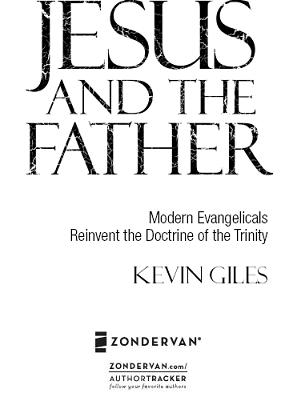
ZONDERVAN
JESUS AND THE FATHER
Copyright 2006 by Kevin Giles
All rights reserved under International and Pan-American Copyright Conventions. By payment of the required fees, you have been granted the non-exclusive, non-transferable right to access and read the text of this e-book on-screen. No part of this text may be reproduced, transmitted, down-loaded, decompiled, reverse engineered, or stored in or introduced into any information storage and retrieval system, in any form or by any means, whether electronic or mechanical, now known or hereinafter invented, without the express written permission of Zondervan.
ePub Edition August 2009 ISBN: 978-0-310-86638-1
Requests for information should be addressed to:
Zondervan, Grand Rapids, Michigan 49530
Library of Congress Cataloging-in-Publication Data
Giles, Kevin.
Jesus and the father : modern evangelicals reinvent the doctrine of the Trinity / Kevin Giles 1st ed.
p. cm.
Includes bibliographical references and index.
ISBN-13: 978-0-310-26664-8
1. Trinity History of doctrines. 2. Evangelicalism. I. Title.
BT111.3.G45 2006
231'.044 dc22
2005034545
CIP
The Scripture quotations contained herein are from the New Revised Standard Version of the Bible, copyright 1989 by the Division of Christian Education of the National Council of Churches of Christ in the United States of America, and are used by permission. All rights reserved.
Scripture verses marked KJV are from the King James Version of the Bible.
All rights reserved. No part of this publication may be reproduced, stored in a retrieval system, or transmitted in any form or by any means electronic, mechanical, photocopy, recording, or any other except for brief quotations in printed reviews, without the prior permission of the publisher.
The website addresses recommended throughout this book are offered as a resource to you. These websites are not intended in any way to be or imply an endorsement on the part of Zondervan, nor do we vouch for their content for the life of this book.
06 07 08 09 10 11 12 13 18 17 16 15 14 13 12 11 10 9 8 7 6 5 4 3 2 1
CONTENTS
T rinitarian life as portrayed in Scripture includes some patterns of subordination. In the economy of salvation, the Spirit, for example, sometimes appears to have little will of his own. He is comparatively unoriginal, an almost pure agent of the Father and the Son. Similarly, in Johns gospel the Son and Father have one will, word, and work among us largely because the Son, by his own testimony, simply reproduces what comes to him from the Father: Whatever I say is just what the Father has told me to say (12:50); the Son can do nothing by himself; he can do only what he sees his Father doing (5:19). The Paraclete, in turn, just teaches the words of the Word (14:26; 16:14).
Most important is the sending pattern in the fourth gospel. The Father sends. The Son sends and is sent. The Spirit is simply sent. You never read that the Son or the Spirit send the Father on any missions.
What must we think of this? What does the subordination pattern tell us about the eternal life of God? Is God locked into the pattern we see in the drama of human redemption? Or is this pattern only a temporal measure?
The picture here is actually complicated. For one thing, we have to recognize that Jesus is the Son of God incarnate. Being incarnate involves certain humiliating limitations. Perhaps part of Jesus subordination to his Father is owed to these limitations.
In fact, before his ascension Jesus seems subordinate to the Spirit as well just the reverse of what we find in Johns gospel. The Spirit conceives (Mt 1:18), compels (Mk 1:12), and inspires (Lk 10:21) Jesus. These facts deepen and complicate the portrait of the Holy Spirit, who, it appears, acts with the will and power of God.
Again, Paul sometimes uses language that suggests not that the center of the Holy Trinity is the Father, from whom the Son and Spirit are only radii. Not at all. Paul sometimes suggests that the divine life centers in the exalted Christ: All things were created by him and for him... in him all things hold together... so that in everything he might have the supremacy (Col 1:16 18). Even in Johns gospel, the functional hierarchy is qualified by the fact that Father and Son mutually glorify each other (13:31 32).
Still further, in the lyric hymn of Philippians 2, Paul tells us of the preexistent Christ, who, being in very nature God, did not consider equality with God something to be grasped, but made himself nothing, taking the very nature of a servant. For human beings jostling for position, volunteering and being sent are sometimes incompatible. The beauty of perfect trinitarian life is that they are the same, one will of God pulsing through triplicate personal life. Pauls servant Christ, who volunteers to make himself nothing, and Johns Son of God, who is sent, are exactly the same person.
Next page
